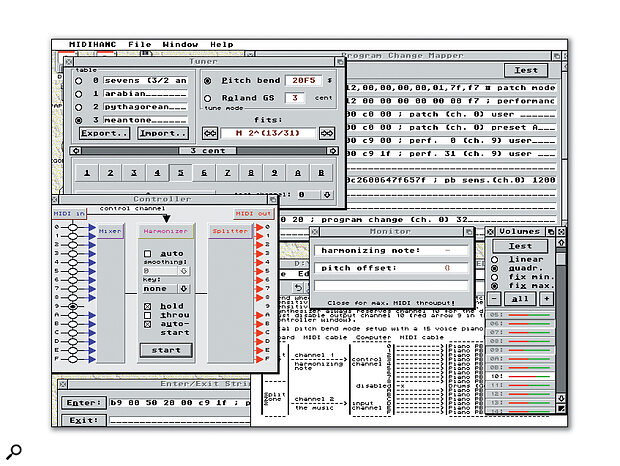 MIDI Enhancer's improved layout and extra features are evident from this busy screen.
MIDI Enhancer's improved layout and extra features are evident from this busy screen.
Derek Johnson explores a way of creating exotic tunings with your Atari, and recommends a fresh source of shareware and freeware.
<!‑‑image‑>The ingenious uses that Atari owners find for their aged machines quite often astounds me. A German musician going by the name of Mad Harry, for example, has produced the innocuously‑named MIDI Enhancer, whose title provides no real clues as to what it actually does. Read on...
Artistic Temperaments
There won't be many of you who'll want what MIDI Enhancer offers, but for those who do, it's a gem. Essentially, it enables you to play non‑equal‑tempered music on any MIDI synth that can operate in Poly mode, and on GS‑compatible (Roland's extension of General MIDI) instruments. When I last gave a brief mention to the software it was at v1.4, and though an interesting tool it was a little baffling in presentation. The recent v2.0 adds more facilities and has an improved, more sleek user interface. It's possible to customise the 'scales' output by the program, but there's a collection of presets with it that includes Meantone, Arabian, Pythagorean and Natural scales. It's even possible to change scales while playing.
In order to create an alternate tuning, MIDI Enhancer requires two input sources, so your controller keyboard needs to be able to transmit data on two MIDI channels at once, with the keyboard split, or you need two MIDI controllers merged to the Atari's MIDI In. The retuning of transformed notes is achieved in one of two ways. First of all, MIDI Enhancer can use pitch‑bend data. The target sound source needs to be 16‑part multitimbral with the same sound assigned to all 16 parts — though interesting hocket‑like effects can be created if you choose different sounds and octave values for each part. The software offsets input notes by as much pitch‑bend as is required to bring a note up or down to the required pitch for the chosen scale. The second method works only with GS‑compatible sound sources, which can respond to so‑called 'Scale Tune' messages over MIDI. This method has the advantage of determining the pitch offsets of each note in a chromatic octave with just one MIDI message.
Beyond the call of duty, the software even offers additional features, such as velocity and program change remapping, and the ability to transmit MIDI data strings, the latter being transmitted whenever you start MIDI Enhancer.
While MIDI Enhancer is an interesting real‑time performance tool, and a good way to explore alternate tuning systems, the only way you'll be able to use its output in a sequence is if you have a second sequencer — whether hardware or a software sequencer running on another computer. The program is compatible with all varieties of TOS, including Atari ST(e), TT, Falcon, Hades and Milan; it's been tested with TOS 4.04 and MagiC 6 on a Falcon 030 and even on an ST Emulator Gold v1.6 running under Windows 98 on a PC (although MIDI I/O apparently isn't yet supported by this ST emulator). And as for price, that'll be nul pounds to you, squire!
members.tripod.de/Rieder/midihnc.htm
Tales From The Crypt
Some of you may remember the Crawly Crypt two‑volume CD‑ROM software collection that was around a few years ago. It brought together all manner of Atari and Falcon public domain and shareware software (with many STe‑ and TT‑specific programs), clip art and demos in a pair of convenient discs. The discs are still very much with us, but the developers have also put the whole lot on‑line. Go and have a browse, and if you find yourself spending a lot of time downloading all the goodies — every kind of software is covered — you can buy the CD collection on‑line. There are two choices: first, the complete Crawly Crypt Archives on one CD, with everything compressed, at US$9.95. Alternatively, you can buy the collection in the original two, mostly uncompressed, volumes for US$9.95 each. Shipping is US$2 per disc to North America, US$3 per disc to the rest of the world.
The same web site where Crawly Crypt can be found is also hosting the Moving Pixels Collection, a CD‑ROM full of games, demos and utilities. There's nothing strictly musical here, but it does bring all the software from the Moving Pixels software house together in one disc. In the case of MPC, only a selection of the content is available for free downloading; the full collection, with every program uncompressed and complete with source code, can be purchased on one US$9.95 CD‑ROM. Many programs will actually run direct from the CD.
www.spythis.com/cca/index.html
Joy To The (Atari) World
When we had a look at Harry Koopman's nifty MIDIJoy mouse–based MIDI controller in November 2000, it wouldn't run on TTs or Falcons. That's now changed, with a new recompiled version. The manual has also been updated, to take account of the changes. It can be downloaded from sites.netscape.net/timconrardy/midijoy.htm, or direct from Harry's new MIDIJoy page. Surf on over to members.tripodnet.nl/hkoopman/midijoy.html. The package still comes in three Zipped parts: the program plus docs; extra data files; and an as‑yet unfinished English HTML manual, for viewing in any web browser.
Compose Yourself
Famed algorithmic composition tool M has been available as a free download for some time now (we last examined it in May 2000) but for the most part users were left to figure it out for themselves. Not any more: the docs for the Atari version have been made available in TXT format by Joel Chabade (currently of the Electronic Music Foundation — www.emf.org — but latterly founder of Intelligent Music, M's original publisher). They can be downloaded from sites.netscape.net/timconrardy/m.htm, and are contained in a 40kB Zip file which un‑Zips into several text files, one for each chapter.
